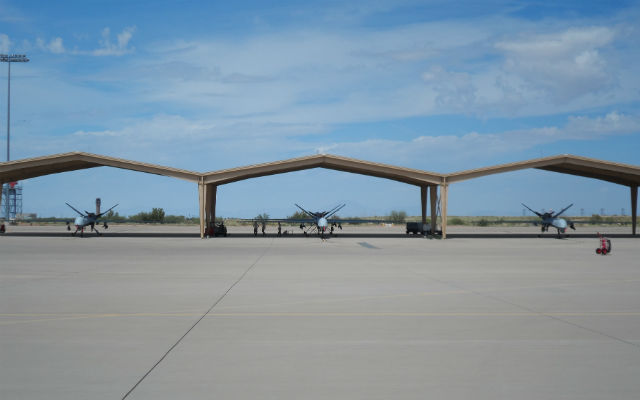 As the number of slots available to foreign allies at the US Air Force’s unmanned air vehicle training school continues to be limited, the UK is considering establishing its own domestic capability, ahead of a planned acquisition of a new fleet of remotely piloted aircraft.
As the number of slots available to foreign allies at the US Air Force’s unmanned air vehicle training school continues to be limited, the UK is considering establishing its own domestic capability, ahead of a planned acquisition of a new fleet of remotely piloted aircraft.
Royal Air Force personnel are currently trained to operate the service’s 10-strong fleet of General Atomics Aeronautical Systems Block 1 MQ-9 Reapers at Holloman Air Force Base in New Mexico, but the USAF’s well-documented UAV pilot shortage has forced it to ration the slots available, prioritising its own needs.
The UK is due to purchase in excess of 20 new Reaper-derived Certifiable Predator B (CPB) UAVs, and is considering introducing its own training system to support this.The CPB is designed to fly in national airspace – something the UK is keen to be able to do – so it would be suitable for training to take place in the same area that it operates.
MQ-9 and MQ-1 training is provided by CAE. Gene Colabatistto, group president for defence and security, says that conversations are under way to help understand what the UK would require.
“The Protector will be based on an MQ-9, and at Holloman there are Royal Air Force officers there, both as instructors and as students,” he says. “But, the US Air Force is capacity-limited, and in general they have limited the number of available slots for international students.
“The UK does still have students there, but I believe what has provided impetus is that it has become clear that they will not be able to fulfil their needs through the US school.”
Colabatistto adds that ongoing conversations suggest that this need will be met through an indigenous capability, but it is not yet decided whether this will be primary, advanced, virtual or live training, or a mix.
“That is at a pre-bid stage,” he says, “but the [UK] government I believe is very much internally refining its requirements, and that will become a competitive procurement.
“As I understand it, the intent is to build an indigenous capability in the UK, because it is needed. I expect that we will see an RfP [request for proposals] later this calendar year, but we don’t know if that will be a draft or final version.”
Other operators of the MQ-9 are also considering their options in light of the USAF availability challenges. Italy has already acquired a zero flight simulator from CAE to carry out training domestically, which means that a live training fleet is not required in addition to the simulator-based capability.
CAE has also bid for UAV training work in the United Arab Emirates, for the Gulf nation’s future fleet of General Atomics Predator XP and unmanned Piaggio Aero P.1HH Hammerheads.
The company created a joint venture in the UAE to bid for C$145 million ($112 million) of work providing naval and rotorcraft training, which it won in June. It is using the same framework to offer the UAV training via a direct military sale. A bid was submitted in the first quarter of this year, Colabatistto says, and a decision is expected near the end of 2016.
Training will be provided to pilots with no prior experience, and there will be a crossover between the two new types that the nation is acquiring.
“It is very clever that the UAE has recognised that there is commonality between the training,” Colabatistto says. “The vision is that they will have a common training schedule.”
Italy operates the Predator and will soon operate the Hammerhead, but has not yet made a decision on its training requirements for the latter.
It has been predicted for some time that Rome may position itself as a training hub for UAVs, offering the simulator capability – plus available airspace – to other nations.
Photo: Beth Stevenson/Flightglobal
Source: Flightglobal
